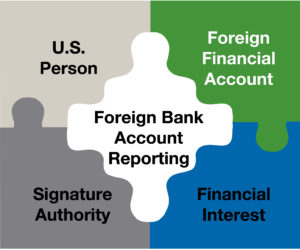Willful FBAR Penalty- Legal Decisions Diminish Taxpayer Prospects for Successful Defense.
 Case Facts.
Case Facts.
April 3, 2018, the U.S. District Court in United States v. Garrity held that, for purposes of the assessment of the Willful FBAR penalty, the Government’s burden of proof is a “preponderance of evidence,” rather than the higher “clear and convincing” standard. The Garrity decision involved the Government suit to reduce the Willful FBAR Penalty to a Judgement. The Court also found that “the Government may prove the element of willfulness in this case with evidence that Mr. Garrity Sr. acted recklessly.” The decision is in keeping with a recent line of Court decisions favoring the Government.
In Garrity, the Government assessed the 31, U.S.C. U.S 5321(a) (5) Willful FBAR Penalty against Paul G. Garrity, Sr., who died in 2008 for his willful failure to report his interest in a foreign account he held in 2005.
Court’s response.
In the Court’s Memorandum and Order, in response to legal brief submitted by the parties, the Court rejected the Taxpayers’ argument that the civil FBAR statute is analogous to the civil tax fraud statute, requiring proof by clear and convincing evidence. The Court also rejected the Taxpayers’ argument that an internal memo by the of Office of Chief Counsel of the IRS calls for a higher standard of proof similar to the burden of proof the Service has when asserting the civil fraud penalty under 26 U.S.C. §6663. In dismissing the Defendants argument, the Court noted that the internal memo predated any Court decision on the subject and further, opined that the internal memo was not binding on the Court.
Instead, the Court relied upon the consistent application of the preponderance of the evidence standard in a civil FBAR action established in United States v. Williams No. 09-437, 2010 wl 3473311, at *1 (E.D. Va. Sept. 1, 2010), rev’d on other grounds, United States v. Williams,489 F. App’x 655 (4th Cir 2012) and consistently followed by other Courts. (See also United States of America v. McBride, 908 F. Supp. 2d 1201-1202 (D. Utah 2012)). Some observers have commented that the decision in Bedrosian should provide hope for the Taxpayer. However, the case is of limited value.
In Bedrosian v. United States of America, 2017 U.S. Dist. LEXIs 56535 (ED PA 2017) the District Court for the Eastern District of Pennsylvania held that the Taxpayer was not willful in his failure to report a larger account on his FBAR. However, the Bedrosian decision should be distinguished on the facts and not viewed as a departure, from Williams or McBride on the application of the criminal standard to the Willful FBAR cases or the standard of proof required to sustain a Willful FBAR penalty assessment.
Despite its ruling in favor of the Taxpayer, the Pennsylvania District Court for the Eastern District did hold that the criminal standard on willfulness does not apply in the case of a Willful FBAR Case and that the government only need show a reckless violation of the statute to apply the higher FBAR penalty. The Court also stated that the preponderance of evidence standard should apply. These principles are in keeping with the prevailing view.
The Court also rejected the Defendants argument that the Government must show that Mr. Garrity, Sr. violated a “known legal duty” in order to establish the “willful element under 31 U.S.C. § 5314 and instead applied the “reckless” criteria.
The recent Court decisions make it difficult, if not impossible, for a Taxpayer to overcome the Assessment of the Willful FBAR penalty since these decisions have emboldened the IRS.
With the recent decision by the IRS to end the Offshore Voluntary Disclosure Program in September of 2018 and the suggestion that Domestic Filing Compliance Procedures may also come to an end, the stakes for Taxpayers could not be higher. Without question, the IRS will pursue these cases with vigor. For those Taxpayers who have yet to make a voluntary disclosure, the failure to do so could have financially catastrophic consequences in the form of the assessment of the Willful FBAR Penalty.





Leave a Reply
Want to join the discussion?Feel free to contribute!